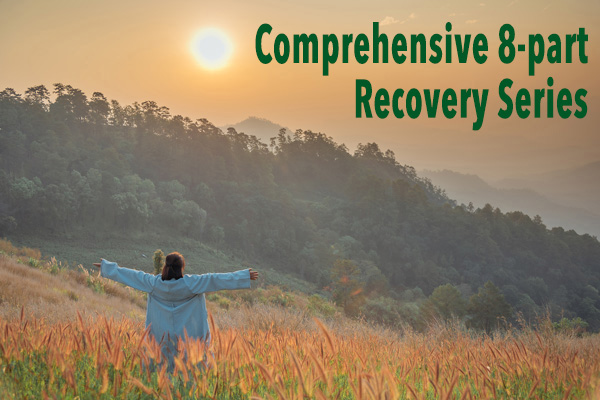
About this series
When you’ve been shattered by an involvement with a sociopath, how do you pick up the pieces? How do you recover from the abuse? How do you make sure it never happens again?
The answers: You need to understand your experience, focus on self-care, and learn tools to protect yourself as you move forward.
This comprehensive series of webinars will help you get started and keep you on track. The instructor, Mandy Friedman, is a licensed professional counselor, clinically certified domestic violence counselor, trauma specialist — and a survivor of abuse herself. She knows exactly what you’ve been through, and in this series, provides the understanding and strategies you need to rebuild your life.
Here’s a customer review of one of the courses that’s included:
Excellent! Mandy is a wealth of information and this came at just the right time for a situation I find myself in and just now figuring out what has been really been happening during 23 years of marriage! A snake in my house, as you stated! And it was shown to me in a dream! I’m already appropriating the tools/skills to protect myself until I can possibly get out of the situation. It feels great to be empowered and I am getting better at it, saying “no”, and using boundaries and getting space. But, it is also helping me better myself so I don’t repeat my own mistakes. I don’t have to feel guilty any longer.
These eight webinars provide you with 12 hours of instruction. The cost of purchasing them separately is $287.50. But when you buy the series, you pay only $199 — a savings of 31%!
About the instructor Mandy Friedman
 Mandy Friedman, LPCC-S, CCDVC, CCTP is a licensed professional clinical counselor, certified clinical domestic violence counselor and clinically certified trauma professional. Mandy is the creator of the educational program S.N.A.P. — Survivors of Narcissistic and Abusive Personalities. This program teaches survivors and concerned loved ones about abusive personalities, targets of abuse, abusive relationships and life in recovery from abuse.
Mandy Friedman, LPCC-S, CCDVC, CCTP is a licensed professional clinical counselor, certified clinical domestic violence counselor and clinically certified trauma professional. Mandy is the creator of the educational program S.N.A.P. — Survivors of Narcissistic and Abusive Personalities. This program teaches survivors and concerned loved ones about abusive personalities, targets of abuse, abusive relationships and life in recovery from abuse.
In her private practice, Clermont Mental Health, Mandy specializes in treating survivors of Cluster B personalities. She is also familiar with the role of addiction and substance abuse in abusive relationships. Mandy’s clients are often in need of trauma-informed care as part of their recovery. This has led her to become an specialist in the topic of Complex Post Traumatic Stress Disorder (C-PTSD). To help her clients, Mandy utilizes mindfulness based cognitive therapy (MBCT), cognitive behavioral therapy (CBT) and psycho-education.
Mandy is a survivor of abuse and has first-hand knowledge of what survivors endure in abusive circumstances and living a healthy life after abuse.
Here’s Mandy explaining the series, followed by details of the courses.
1. Start your recovery from emotional and psychological abuse
Lies, gaslighting and betrayal — involvement with an exploiter leaves you shaken to the core. In this webinar, you’ll gain the understanding, and learn the strategies, that will enable you to begin your recovery and rebuild your life.
Highlights
-
- Tools for navigating toxic people
- How Complex PTSD affects recovery
- The importance of self-care
- How shame affects recovery
- Implementing personal boundaries
- Identifying healthy people and healthy relationships
Learning objectives
After this course, you should be able to:
-
- Understand the importance of actively following a program of recovery
- Implement strategies for minimizing contact with toxic people
- Recognize behavioral symptoms of Complex PTSD
- Protect yourself by establishing personal boundaries
- Identify healthy traits and behaviors in others
2. Self-care for survivors
When you’ve been devastated by a sociopath, rebuilding your life starts with taking care of you. Learn to focus on your own needs and create a self-care for survivors routine by setting boundaries; reducing stress and moving towards physical, emotional and spiritual health.
Highlights
-
- Why self-care for survivors is especially important
- 5 common myths about self-care for survivors
- Benefits and challenges you can expect with self-care
- How to create and maintain a self-care routine
- 26 strategies for taking care of yourself
Learning objectives
In this course, you will learn to:
-
- Love and nurture yourself
- Be comfortable with setting new priorities
- Say “no” and set boundaries
- Remove unsupportive people, places and things from your life
- Be patient with yourself as you make positive change
3. Self-care for Complex PTSD
If you endured physical, emotional, psychological, sexual and/or financial abuse for a long time, you may be suffering from C-PTSD. Learn how to recognize the symptoms and create your own recovery program.
Highlights
-
- Patterns of life events that may cause complex PTSD
- Typical symptoms of C-PTSD
- How C-PTSD affects your brain
- How C-PTSD can cause you to accept the unacceptable
- Therapeutic techniques for treating C-PTSD
Learning objectives
After this course, you should be able to:
-
- Recognize if you may be suffering from C-PTSD
- Understand how C-PTSD affects your decision-making
- Advocate for yourself when seeking professional help
- Set firm boundaries so you can heal from the trauma
- Determine who is safe to let into your life and who is not
4. Tools for navigating narcissists and other manipulative people
Sometimes it’s not possible to cut a disordered person out of your life. Learn the tools and strategies you need for navigating narcissists, such as emotional shielding, time limits and neutralizing flying monkeys.
Highlights
-
- Narcissistic personalities and patterns
- What manipulators look for — strength and resilience
- Tools for dealing with narcissists — like No Contact and grey rock
- Getting honest about the people in your life
- Knowing your limitations and resources
Learning objectives
After this course you should be able to:
-
- Identify narcissists and manipulators
- Understand how manipulators choose their targets
- Build a toolbox for dealing with disordered personalities
- Spot and neutralize flying monkeys
- Protect yourself through emotional shielding
5. Overcoming shame — how to feel worthy of love and respect
Abusers lie about you, cause you to make bad choices and induce you feel shame. Learn to release this painful and destructive emotion.
Highlights
-
- The destructive effects of shame
- Understanding the difference between shame and guilt
- Why shame makes it difficult to set boundaries
- 6 ways abusive people use shame
- 9 strategies for overcoming shame
Learning objectives
After this course, you should be able to:
-
- Discover the sources of any shame that you feel
- Recognize your own countermeasures and why they are counterproductive
- Dismantle any myths about abuse that you believe
- Analyze your own positive traits that abusers have targeted
- Take steps to overcome your own feelings of shame
6. How understanding empathy and emotional intelligence protects you from abuse and enriches your life
Empathy is central to our humanity, but some people don’t feel it. Learning to recognize a lack of empathy and a deficit of emotional intelligence will enable you to protect yourself from abusers and thrive in your relationships.
Highlights
-
- Why empaths are vulnerable to sociopaths
- Why emotional intelligence and empathy are important for survivors
- 9 aspects of emotional intelligence
- Understanding the spectrum of abusive personalities
- Why some people lack empathy
- How your empathy helps you recover from narcissistic abuse
Learning objectives
After this course, you should be able to:
-
- Understand how empathy — or lack of empathy — affects you
- Determine if a person is capable of empathy — or not
- Detect a deficit in empathy or emotional intelligence
- Protect yourself from the unempathetic people in your life
- Fortify yourself with emotional shielding
7. Survivor’s guide to healthy people and healthy relationships
Maybe you were vulnerable to a sociopath because you never experienced healthy relationships. Learn how healthy people behave, so you can choose fulfilling involvements.
Highlights
-
- Why many survivors do not know what a healthy relationship is
- How you can tell if someone is mentally and emotionally healthy
- What mentally and emotionally healthy people do not do
- Understanding the key elements of a healthy relationship
Learning objectives
This course should help you to:
-
- Recognize mentally and emotionally healthy people
- Determine if a relationship provides balance to your life
- Avoid mentally and emotionally unhealthy people
- Understand that real love is not transactional
8. How abusive parents affect you and how you can recover
Maybe your depression, anxiety or hypervigilance go way back. If your parents were abusive or disordered, here’s how to start overcoming the damage.
Highlights
-
- 27 behaviors of abusive parents that damage their children
- How children of abusive parents unconsciously repeat old patterns in new relationships
- Why children of abusive parents feel unworthy of love and happiness
- How to determine whether your therapy should include family members
- Overcoming the guilt of going No Contact with your abusive parents
Learning objectives
After this course, you should be able to:
-
- Identify parental behaviors toward you or your siblings that is or was abusive
- Describe psychological, emotional or physical conditions caused or exacerbated by abusive parenting
- Enumerate steps survivors can take to advance your own recovery
- Evaluate survivors’ obligations for caring for abusive parents in their old age
- Describe ways you, as a survivor, can protect yourself when No Contact is not an option
Cost and credits
The cost for this course is only $199 for 12 hours of instruction — a savings of 31%! Once you purchase the course, you can access it online as long and as often as you want.
Although this course does not award continuing education credits, you will be able to download a certificate of achievement upon completion.
After the abuse, this series helps you understand and overcome what happened, recover your sense of self, set boundaries so it never happens again, and identify people who deserve to be in your inner circle. Yes, you can live the life you truly want.
Customer reviews
Add your review — click and scroll down

